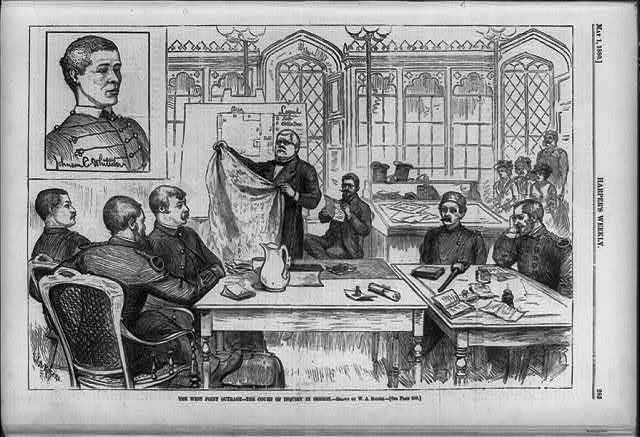On this dayApr 05, 1880
Black West Point Cadet Brutally Beaten by White Students Days Before Graduation
In the early hours of the morning on April 5, 1880, Cadet Johnson Whittaker, one of the first Black students in the U.S. Military Academy at West Point, was brutally beaten by white cadets while sleeping in his barracks. Three white cadets ambushed Cadet Whittaker, slashed his head and ears, burned his Bible, threatened his life, and then left him in his underwear, tied to the bed and bleeding profusely.
Born enslaved in South Carolina in 1858, Cadet Whittaker received a congressional appointment to the U.S. Military Academy in 1876. For most of his time at West Point, Cadet Whittaker was the only Black cadet at the institution; he endured social exclusion and racial terrorism perpetrated at the hands of white cadets and faculty alike. Twenty-three Black cadets attended West Point between 1870 and 1890, but due to the violent discrimination that they faced, only three graduated. Cadet Whittaker would later testify that he had “read and heard about the treatment that [Black] cadets received there, and expected to be ostracized.”
After Cadet Whittaker reported to West Point administrators that he had been attacked, the institution opened an investigation into him and declined to hold his white attackers accountable. Administrators instead claimed that Cadet Whittaker had staged the attack to get out of his final exams, and in May, a West Point court of inquiry found Cadet Whittaker guilty of that charge. He was forced to take his final exams while incarcerated and withstand court-martial proceedings in New York City where the army prosecutor repeatedly referred to Black people as an “inferior race” known to “feign and sham.”
In January 1881, Brigadier General N.A. Miles affirmed Cadet Whittaker’s conviction and authorized him to be expelled from West Point, dishonorably discharged from the military, and held for continued imprisonment. Cadet Whittaker’s case was ultimately forwarded to President Chester A. Arthur for approval, and, a year later, President Arthur issued an executive order overturning the conviction based on a finding that military prosecutors had relied on improperly admitted evidence. By the time of President Arthur’s intervention, Cadet Whittaker had been incarcerated for nearly two years; even after his conviction was overturned, West Point reinstated Cadet Whittaker’s expulsion, claiming he had failed an exam.
Johnson Whittaker went on to work in several professional fields and raise a family, including several generations of descendants who served in the U.S. military. In 1995, more than 60 years after his death, Mr. Whittaker’s heirs accepted the commission he would have received upon graduating West Point. At the ceremony, President Bill Clinton remarked: “We cannot undo history. But today, finally, we can pay tribute to a great American and we can acknowledge a great injustice.”
To learn more about the racial discrimination and violence Black service members and veterans have faced in the U.S. military, explore EJI’s report, Lynching in America: Targeting Black Veterans.

Portrait of Cadet Whittaker at the court-martial proceedings. (Library of Congress)
About EJI
The Equal Justice Initiative works to end mass incarceration, excessive punishment, and racial inequality.
About this website
Until we confront our history of racial injustice and its legacy, we cannot overcome the racial bias that exists today.
 Learn more
Learn more